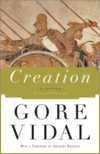|
|

|
Classical Gore
by Steven Saylor
Creation by Gore Vidal
(Random House, 1981)
|
Some years ago, Gore Vidal hit upon the idea that one man, given a long enough life, opportunity to travel, and a knack for being in the right place at the right time, could have met face to face with Zoroaster, Socrates, the Buddha and Confucius. Vidal decided to create that man, and Creation
is the result.
It may be the most panoramic historical novel ever written. (“It sounds like something Michener would write,” Vidal says, “but it is’t.”) The time: the fifth century B.C., which Vidal calls “the most extraordinary century in the history of the human race,” when “every idea we have today was conceived.” The setting: Greece, Persia, India, Cathay. The object: to illuminate the origins of the ancient thought systems that have dominated the world, East and West, ever since. Vidal has never been faulted for lack of ambition.
Creation is the memoir of Cyrus Spitama, grandson and unenthusiastic spiritual heir to Zoroaster, the original prophet of monotheism and judgment after death. As emissary of the Persian kings Darius and Xerxes, Spitama travels the world. His personal quest is for a solution to “the only important subject there is”—the creation of the universe. The hair-splitting Greeks infuriate him, the nihilism of the Buddha he finds useless; only Confucius, a fellow political animal, earns his respect. In the course of Spitama’s trek, the past reflects on the present. Creation
is really about politics, and political behavior, Vidal asserts,
is the same no matter where one travels in space or time, no
matter what the local shamans preach. Cynicism without end, amen.
It has been almost twenty years (not counting his disowned
screenplay for Caligula) since Vidal trained his gimlet
eye on the ancient world. Julian, an unflinching examination
of the sordid death of paganism and the more sordid rise of Christianity,
still has the power to shock the pious and comfort unbelievers.
Creation goes several steps further in explaining why
the world thinks as it does, and why religion is what it is.
It is a better novel than its predecessor, proof that Vidal is
still evolving. The strict adherence to the historical record
that made parts of Julian seem obligatory rather than inspired is overcome here by a technical master of space, time and memory that is astonishing. The vertigo effect, whereby the reader is swamped by half-familiar names and incidents, always a danger in historical fiction, is relieved by absolute narrative control. The phantasmagorical effect that Vidal had admired in his only rival at this sort of thing, Mary Renault (“marvelous cities, strange landscapes, colliding cultures”), largely absent from the less far-flung Julian, springs full-blown
in Creation. The courts of the East are moonlit and exotic.
Certain images, like the copper-plated Persian citadel of Ecbatana
rising like a Mormon temple out of mountain forests, or a startling
Indian fertility rite involving a queen, a priest, and a horse,
are unforgettable.
The device of the narrator who goes everywhere and sees everything can be perfectly awful in the wrong hands. Too often the narrator is merely a cipher recording the activities of historical figures more interesting than himself. Vidal’s Spitama is an aloof but sympathetic narrator, attractively jaded but still a believer in virtue. He is witty. His sentences flow in fascinating rhythm. He tells scandalous anecdotes that always make a point about human behavior. On imagines Babylonian talk-show hosts dying to book him on their shows.
Cyrus Spitama speak in a voice uncannily like that of Myra
Breckenridge. And Aaron Burr. And Gore Vidal.
This overriding voice, and the impeccable sense of timing and style that makes each of Vidal’s essay a small miracle, has been criticized in his fiction. He writes with such clarity of purpose that looking for the subtle conceits and ingenious reverses can become more fun that the story itself, and with such consistency of wit that one begins to anticipate the punchlines, and to wish for a flash of unforeseen and unrefined emotion, for one uncalculated sentence. That sentence might tell us something we do not know about Gore Vidal.
But Vidal’s is the voice of intellect and reason. He is not concerned with baring the passions of the soul; his passion is for political truth, and for flawless prose. The jolts of catharsis to be found in the best works of Mary Renault never come to his characters. But then, Renault has always tried to be Euripides. Vidal at heart is a cultured Roman patrician and composer of exquisite satires, not a tragic Greek poet. Renault plays psychoanalyst to the ancient word. Vidal plays—Vidal.
Quo vadis? There are portents that suggest the course of the
future.
Three years after the phenomenal success of Burr in
1973, Vidal produced 1876. Vidal wrote it, he says frankly,
to bridge at midpoint the two-century gap between Burr
and Washington, D.C., and thereby create a highly marketable
commodity called The American Trilogy.
Two trilogies are better than one. Can Vidal long resist the
temptation to write the one volume he now needs to create a Classical
triptych? The midpoint between Creation and Julian lies somewhere in the first century B.C, the age of Pompey, Caesar, Spartacus and Cicero, when the Roman Republic imploded amid intimations of empire, a subject of some relevance to America in the age of Reagan. It’s been done before, of course—but not Vidal’s way. |